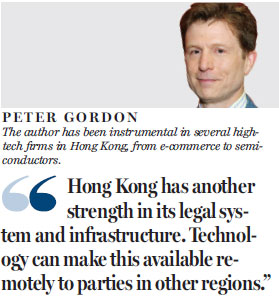Government intervention not the only spur for innovation
Updated: 2016-03-10 08:14
By Peter Gordon(HK Edition)
|
|||||||
Financial Secretary John Tsang Chun-wah's recent budget devoted considerable space, and money, to technology and innovation, including some HK$17 billion in spending. We'll all now have to learn about "FinTech" (a somewhat vague term implying a melding of finance and technology), "blockchain" (a way of recording the validity of a digital package without a central registry, used most famously as the basis of the Bitcoin digital currency), and other new terms of the trade.
Will any of this spending and focus work? Those who confidently predict it as a game-changer must have a crystal ball app that I am unaware of. Logic and history indicate caution.
One allocation of this money is in matching venture capital finance. But if government officials were good at picking winning business models, they wouldn't be government officials. So, presumably the selection is being outsourced to the "professionals", i.e. venture capital companies.
However, if a technology business plan had potential, the private sector would - presumably again - fund it without government assistance. The government is, by entering the market, therefore arguing that there is some sort of market failure preventing this from happening. While the absence of a "Silicon Harbour" is not ipso facto evidence of a market failure, it is not beyond the realm of reason that there is market failure of some sort.
But of what sort, exactly? Without specifying this exactly, it is hard to know how government involvement will resolve it. Indeed, government financing might make things worse. By lowering the cost of capital in this specific sector and removing some of the market-induced rigor, government involvement may perversely result not in more financing for good projects that would have been financed anyway, but rather in facilitating poor ones. The availability of this financing may even have a deleterious effect in inducing companies to chase this pot of money rather than concentrate on actual development and innovation.
Implicit in the government reasoning is that financing will do more than lower capital costs: It will engender a new tech ecosystem, with self-reinforcing feedback loops of finance, startup companies, jobs, experience, education, etc. It's a nice picture; it might even happen. But government finance is not a sufficient condition and it might not even be a necessary one.
One problem in this discussion is that much of what is labelled "innovation" is nothing of the kind, but rather the application of technology to existing business models. There is of course nothing wrong with innovative uses of technology, far from it. The darlings of the so-called "sharing economy" may not be doing anything very new, but they do it much better than it was done before, so much so that the quantitative improvement appears qualitative. But this sort of innovation isn't fundamentally different from other non-tech creative business or industry solutions. Given that today almost everything will involve technology, this means that every creative business endeavor of any kind can be deemed "innovative", especially if it can be made to have a smartphone interface.
Innovation would in practice normally require that the R&D have at least some amount of "R" in it. Applied technology has many benefits - Hong Kong has proven rather adept at it, resulting in it being a world leader in certain industries. But there is subtle reason why some research is needed for innovation to pay off. Hong Kong is in general a small market: A mere application of technology is likely to have much greater economies of scale elsewhere and thus be developed faster and better. There isn't much upside in mere implementation of overseas-developed solutions and if the government wishes new ones to be developed here to reap the benefits of the resulting tech jobs and expertise, it may well have to engage in some market protection.
A Hong Kong-developed solution will therefore probably need a user base much wider than just Hong Kong and for that, it must include something actually new that does not now exist. And that, strictly speaking, is innovation.
While some innovations arise from nowhere, most arise from an ecosystem that is supportive in some way, one in which many of the pieces are already in place. It is no coincidence, therefore, that "FinTech" seems to be in pole position here. But some of the proposed applications seem more copycat than innovative while ignoring the disruptive technologies such as the Octopus card already in our midst.
Hong Kong has another strength in its legal system and infrastructure. Technology can make this available remotely, and inexpensively via automation to parties in other regions.
Finally, there is that big market across the border. The main thing that makes China different from everywhere else - barriers being opportunities of course - is Chinese. If Chinese-English translation could be made to work, actually work, seamlessly, error-free and fluently, the possibilities are almost endless. That would be innovation indeed.

(HK Edition 03/10/2016 page10)